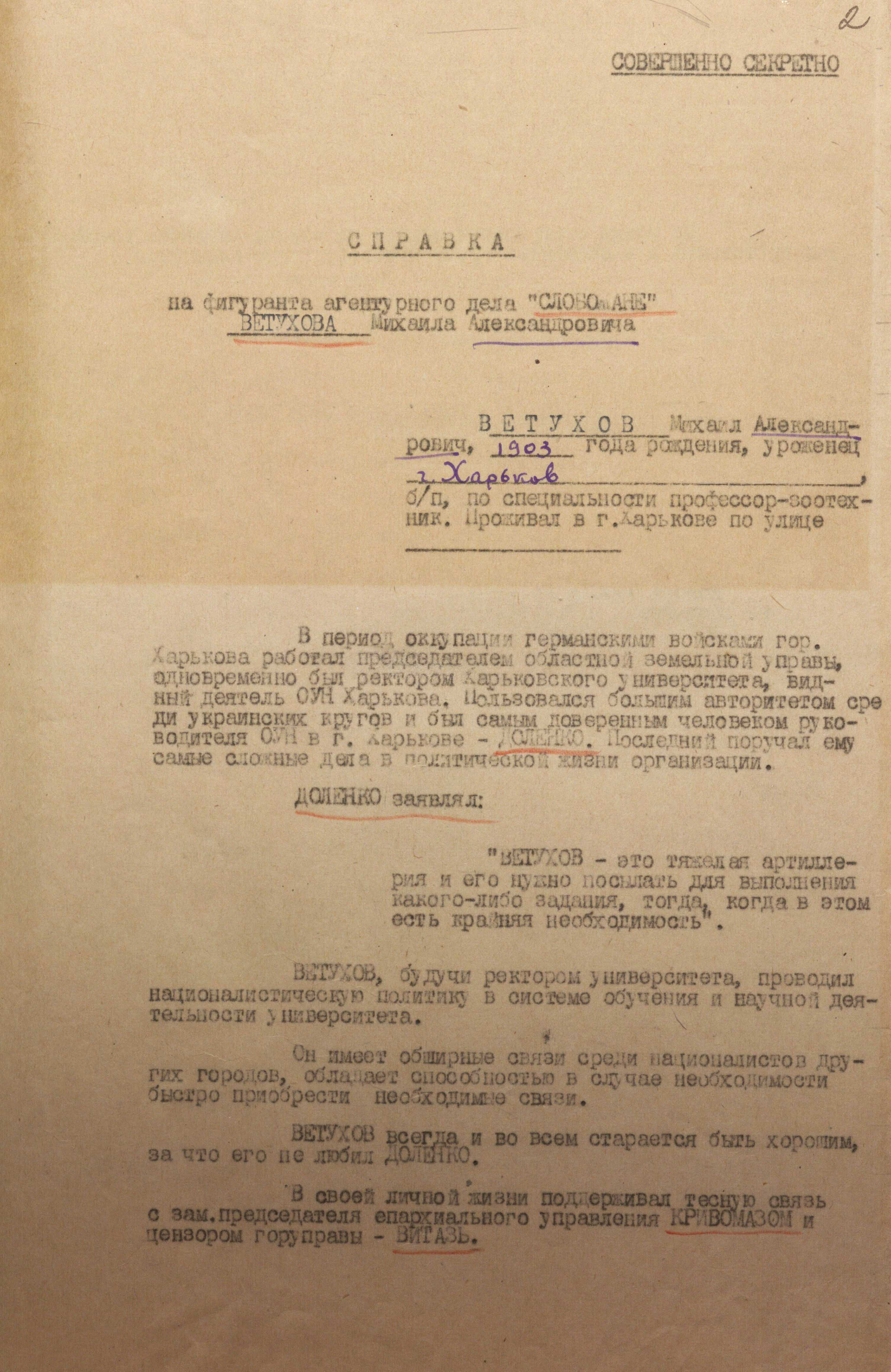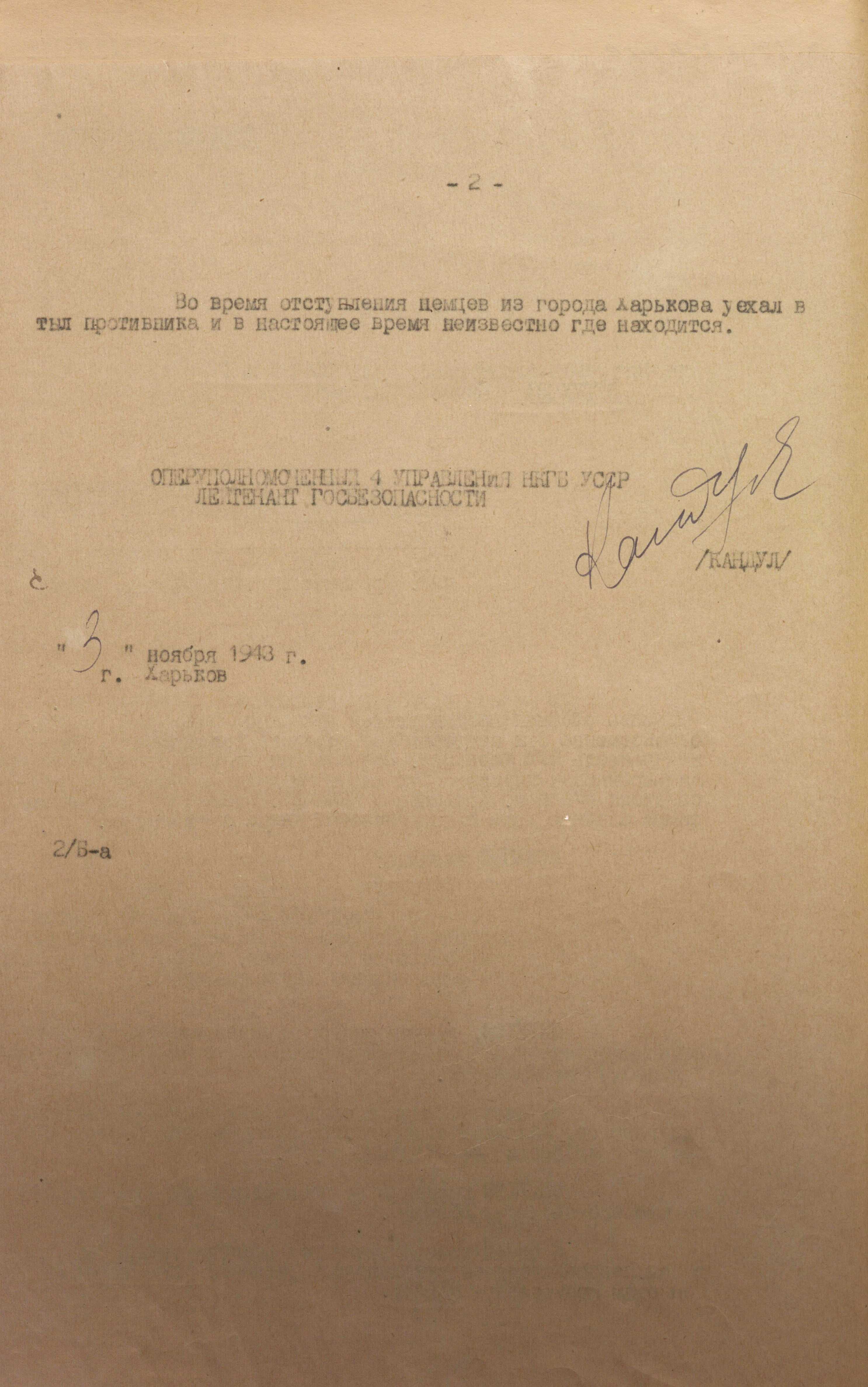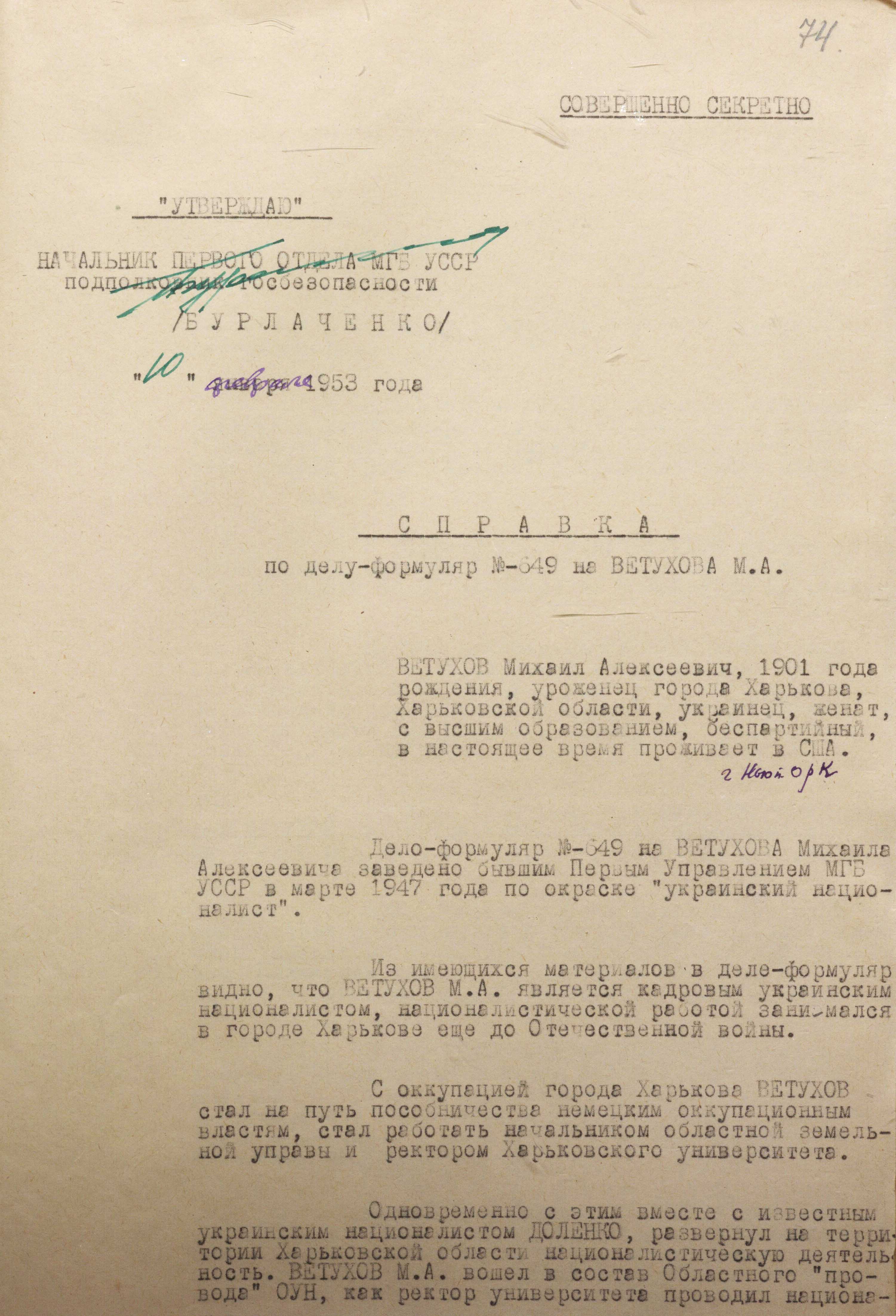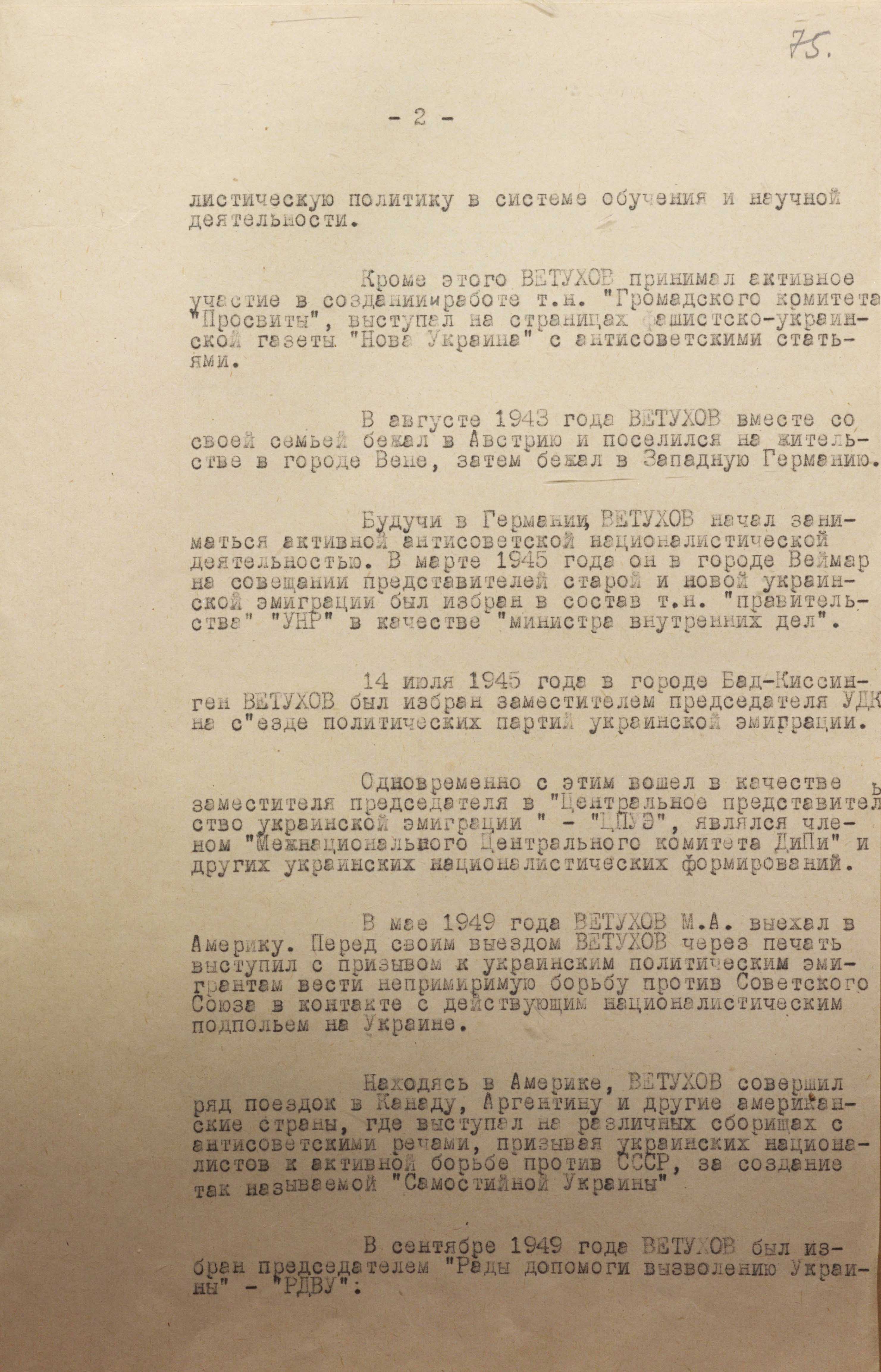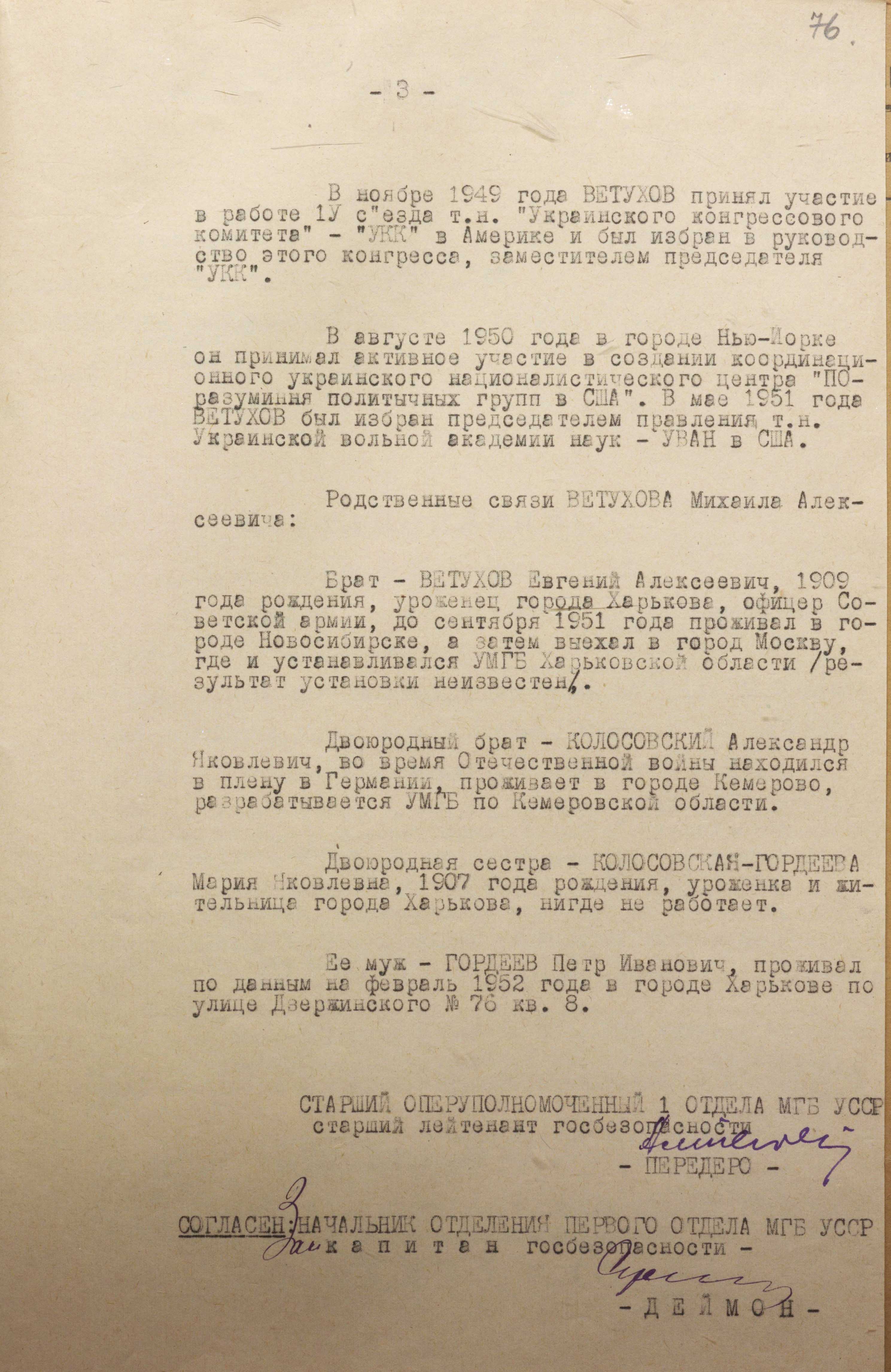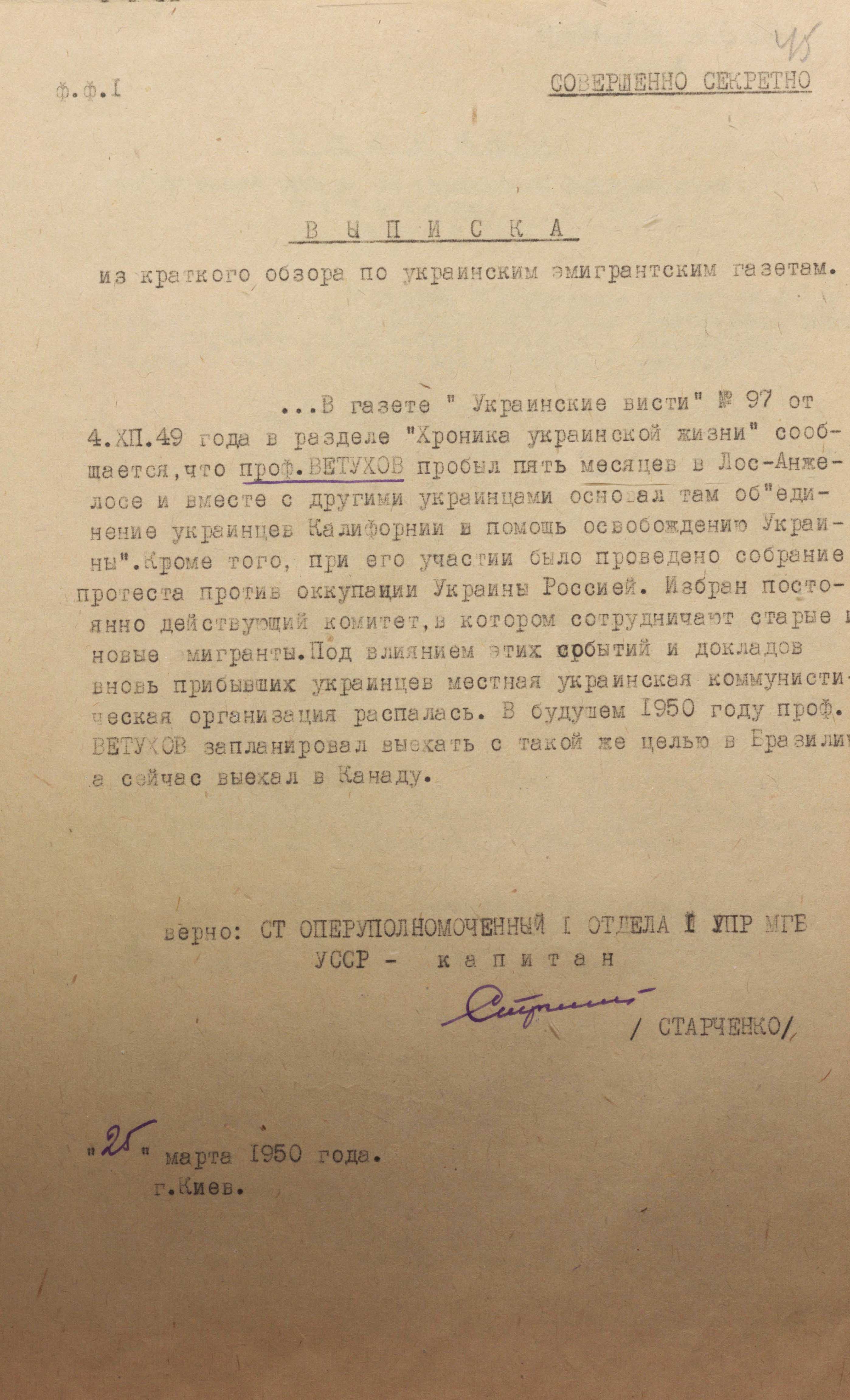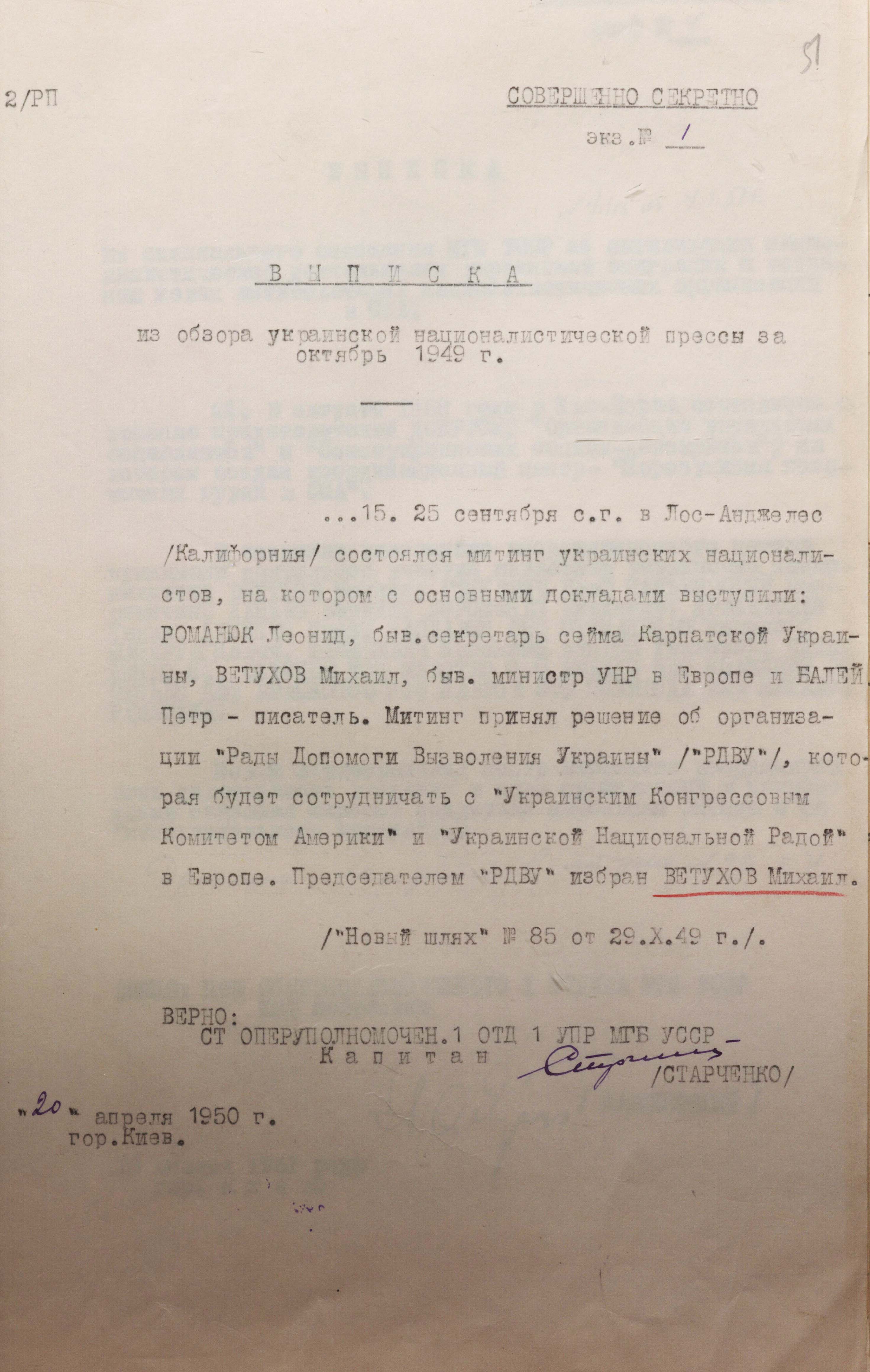Mykhailo Vetukhiv. “For the Ukrainian Cause – from the American Standpoint”
1/31/2025
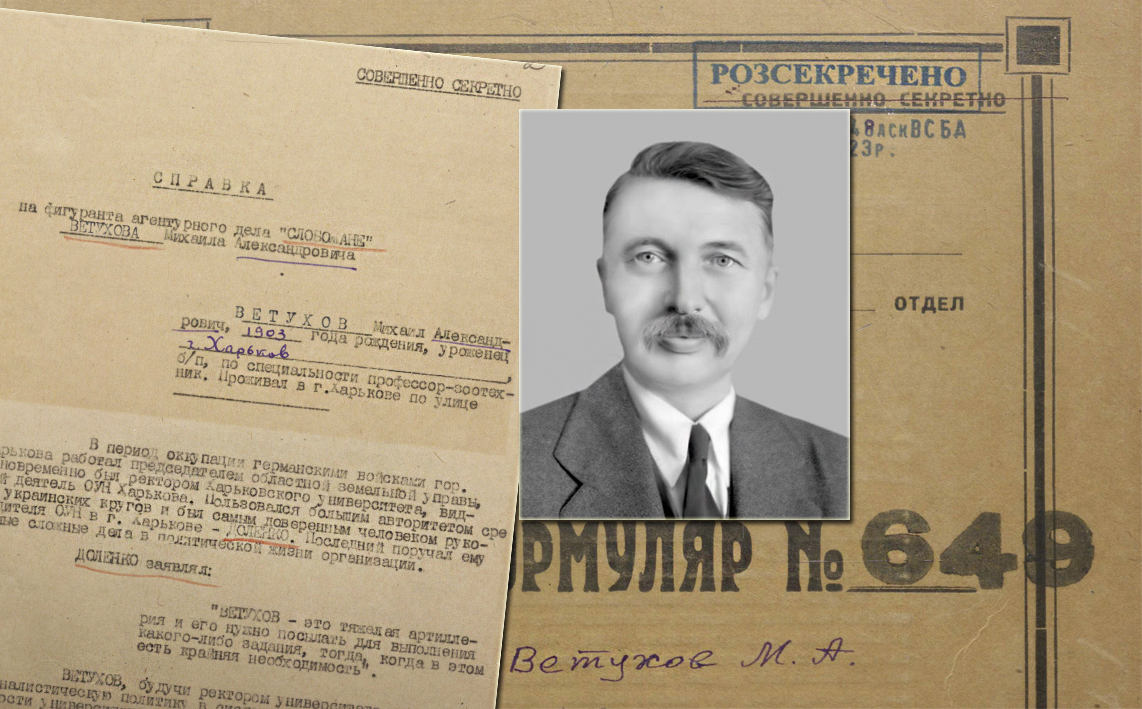
When a number of Ukrainian activists had moved from Europe to America after the World War II, the activities of some of them were monitored by the mgb/kgb of the ussr only through publications in the emigration press. Excerpts and clippings from such articles were used to form operational case files. Today, these materials provide a glimpse of how Ukrainian emigrants immediately after their arrival would join the struggle for the restoration of Ukrainian statehood and the support of this process by the governments of the United States, Canada, and other countries.
“OUN’s Heavy Artillery in Kharkiv”
Mykhailo Vetukhiv was noticed by the nkvd in November 1943, immediately after the liberation of Kharkiv from Nazi troops. One of the papers referred to him as a defendant in the “Slobozhany” case. It was noted that during the occupation of Kharkiv, he was the head of the regional Land Uprava (Administration – Transl.) and at the same time the Rector of Kharkiv University and an active member of the Melnyk wing of the OUN. The following was reported about his activity:
“He had great authority in Ukrainian circles and was the most trusted person of the OUN leader in Kharkiv, Dolenko. The latter entrusted him with the most difficult matters in the political life of the organization.
Dolenko stated: “Vetukhiv is heavy artillery, and he can be sent to perform a certain task come an extreme need.
As the rector of the university, Vetukhiv pursued a nationalist policy in the education and research system.
He has extensive ties with nationalists in other cities and is able to quickly establish the needed contacts.”
(FISU. - F.1. – Case 9799. – P.2).
Another paper states that he took an active part in the work of the Prosvita society and published anti-soviet articles in the local newspaper “Nova Ukraina”. The nkvd apparently failed to collect more negative information on M. Vetukhiv from the time of the occupation to compromise him. At least the case file that was opened on him in March 1947, does not contain any information about this. Nor does it mention that he was arrested by the Gestapo for his active nationalist activities. Open sources about that period report that in 1942 he was elected Rector of Kharkiv University, but did not work in this position for long, because in 1943 he was arrested by the Gestapo, tortured, and taken to Lviv, where he was allowed to engage in scientific activity. But this was completely different information which did not fit the image of a “traitor” the chekists wanted to portray him as.
By the time the case was opened, M. Vetukhiv was already living in the German city of Bad Kissingen and playing a prominent role in the social and political life of the Ukrainian community in Europe. So they switched to tracking that particular activity of his.
“In Germany, Vetukhiv began to actively engage in anti-soviet nationalist activities,” reads a note from the First (Intelligence) Directorate of the mgb of the Ukrainian ssr. “In March 1945, at a meeting of representatives of the old and new Ukrainian emigration in Weimar, he was elected to the so-called “government” of the “UPR” as “Minister of the Internal Affairs”.
On June 14, 1945, in the city of Bad Kissingen, Vetukhiv was elected deputy of the UDP (Ukrainskyi Dopomohovyi Komitet – Ukrainian Aid Committee – Transl.) at a congress of political parties of Ukrainian emigrants.
Simultaneously, he became a Deputy Head of the “Tsentralne Predstavnytstvo Ukrainskoi Emihratsii [TsPUE] – Central Mission of Ukrainian Emigration – Transl.), was a member of the “Interethnic Central Committee of the DP” and other Ukrainian nationalist formations.”
(FISU. - F.1. – Case 9799. – P.75).
In May 1949, the mgb received information that M. Vetukhiv had left for America. One of the emigrant newspapers published an article stating that before his departure he had appealed to political emigrants to continue to wage an irreconcilable struggle against the ussr together with the underground in Ukraine. All this became the basis for putting him on the wanted list.
At the Head of the Ukrainian Free Academy of Sciences in the United States
The late 1940s was a period when the young Ukrainian wave of emigrants was joining the ranks of several previous waves of emigrants already rooted in the United States, bringing the information about what was actually happening on Ukrainian lands and a new vision of further struggle for the Ukrainian cause.
M. Vetukhiv was one of those bright representatives. As noted in archival documents, immediately after arriving overseas, he made a number of trips to Canada, Argentina, and other countries. There, he spoke at various meetings, telling about the state of affairs in Ukraine, about the fact that the Ukrainian Insurgent Army did not stop fighting to restore Ukraine's independence, and that that struggle needed the support of the entire democratic world. The file contains excerpts from newspapers that traced M. Vetukhiv's activity.
An excerpt from the newspaper “Novyi Shlyakh”, No. 85 of October 29, 1949:
“On September 25, a meeting of Ukrainian nationalists was held in Los Angeles (California), at which the main speakers were: Leonid Romaniuk, former Secretary of the Council of Carpathian Ukraine, Mykhailo Vetukhiv, former Minister of the UPR in Europe, and Petro Bahaliy, a writer. The meeting decided to organize the “Rada Dopomohy Vyzvolenniu Ukrainy” (RDVU) (“Council for the Liberation of Ukraine”– Transl.), which would cooperate with the Ukrainian Congress Committee of America and the Ukrainian National Council in Europe. Mykhailo Vetukhiv was elected as the head of the RDVU”.
(FISU. – F.1. – Case 9799. – P. 51).
From a brief review of the Ukrainian emigrant press:
“...The newspaper “Ukrainski Visti”, No. 97 of December 4, 1949, in the section “Chronicle of Ukrainian Life” reports that Prof. Vetukhiv spent five months in Los Angeles and, together with other Ukrainians, founded an Association of Ukrainians of California to help liberate Ukraine. Besides, he participated in protests against russia's occupation of Ukraine. A permanent committee was elected, in which old and new migrants cooperate. Under the influence of those events and the reports of the Ukrainians who had just arrived, the local Ukrainian communist organization fell apart. In the future, in 1950, Prof. Vetukhiv planned to visit Brazil for the same purpose, but now he has left for Canada.”
(FISU. – F.1. – Case 9799. – P. 45).
Many materials are devoted to M. Vetukhiv's participation in the IV Congress of the Ukrainian Congress Committee of America (UCCA), held on November 5-6, 1949, in Washington, DC. They state that this forum was attended by more than 30 representatives of the new Ukrainian emigration. Among them were Professor Mykhailo Vetukhiv (a representative of the state of California), former Prime Minister of Carpathian Ukraine Julian Revai, Professor Roman Smal-Stotskyi, Generals Pavlo Shandruk and Oleksandr Zahrodskyi, Head of the Central Representation of Ukrainian Emigration Vasyl Mudryi, and others.
M. Vetukhiv made a speech themed “The Current Situation in soviet Ukraine”. On the second day of the Congress, the question of the need to introduce one representative of the new Ukrainian emigration to the UCCA board was raised. The candidacies of V. Mudryi and M. Vetukhiv were submitted for consideration and voting. 30 people voted for the former and 129 for the latter. M. Vetukhiv was a member of the board and Deputy Head of the UCCA in 1949-1955 and used the rostrum of the Organization to convey his vision of ways to resolve the Ukrainian question.
The documents point out that at the Congress also spoke representatives of “warring Ukraine” – Mykola Lebed, and of the “UPA raiding units” – “Lahidnyi” (Obviously, Lev Futala was meant, whose pseudonym was Lahidnyi – note), senators, members of the US Republican Party, members of local authorities. And a greeting message from US President Harry Truman was read out.
In August 1950, in New York, M. Vetukhiv participated in a meeting of representatives of a number of Ukrainian organizations, which created a coordination center – Agreement of Political Groups in the United States. And one of the most significant events in his life was his being elected in the same year as Chairman of the Board of the Ukrainian Free Academy of Sciences (Ukr. Abbr. UVAN – Transl.) in the United States. That is, he became the first President of this academic research institution in the United States. His task was to adapt Ukrainian science to American realities and to make it interesting to the American society. And he managed to unite Ukrainian scientists, build the Academy from scratch, and bring it to a fairly high scientific level.
By that time, M. Vetukhiv was already a well-known geneticist at Columbia University, a Professor at the Ukrainian Free University and the Ukrainian Technical and Economic Institute. But the mgb did not know about all his scientific regalia, research, books, and other achievements. A resolution dated February 3, 1953, stated: “Due to the fact that Vetukhiv left for the United States, there are no opportunities for his agent cultivation.”
M. Vetukhiv passed away on June 11, 1959. He was buried in the Ukrainian pantheon at St. Andrew's Cemetery in South Bound Brook (USA).
